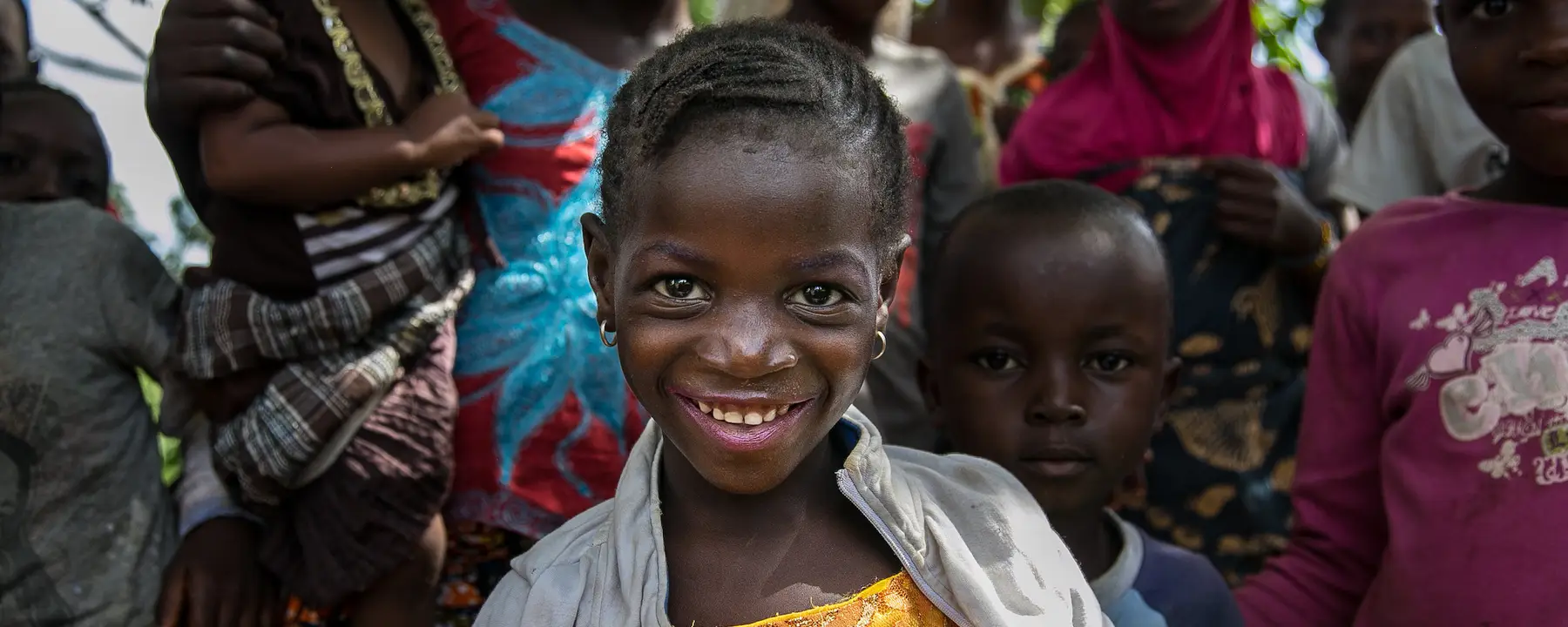USAID’s StopPalu project achieved significant gains against Guinea’s leading cause of illness and death
Objective
Assist the government of Guinea to achieve targets in reducing malaria morbidity and mortality through multiple interventions in prevention, diagnosis and treatment, and capacity building of the Ministry of Health (MOH) and the National Malaria Control Program (NMCP).
Approach
StopPalu partnered with local governments, organizations, and communities to improve malaria prevention and care for the most vulnerable. Interventions include distribution of insecticide-treated nets (ITNs or bed nets), intermittent preventive treatment of malaria in pregnancy, malaria case management, malaria prevention among young children, and messaging activities.
Impact
StopPalu contributed to a reduction in the national malaria prevalence rate from 44% in 2012 to 15% in 2016 by training 1,400 volunteer community health workers (CHWs) in a set of skills known as malaria community case management; distributing 6 million bed nets to over 1.5 million households; and improving diagnostic capacity so that 100% of fever cases are tested for malaria.
Communicable Disease in Guinea - The Dangers of Malaria
Malaria is the leading communicable disease in Guinea and among the five leading causes of in-patient deaths among children under five years of age. Through the efforts of the country’s National Malaria Control Program—with support from the U.S. Agency for International Development (USAID)-led U.S. President’s Malaria Initiative (PMI)—tremendous progress has been made to reduce malaria prevalence, annual malaria incidence, and in-patient deaths.
Below we describe how the StopPalu project (2013–2017)—deriving its name from paludisme, French for malaria—boosted local capacity to prevent, diagnose, and treat malaria. This work continues through the StopPalu+ project. Read more about StopPalu+ here.
A Community-Driven Approach to Fighting Malaria
To help Guinea meet ambitious malaria reduction goals, in 2013, USAID launched a project called StopPalu with funding from PMI and implemented by RTI. Operating in half of Guinea’s 38 districts, StopPalu:
-
Contributed to a reduction in the national malaria prevalence rate—from 44% in 2012 to 15% in 2016.
-
Helped train more than 1,400 volunteer community health workers (CHWs) in a set of skills known as malaria community case management.
-
Trained over 28,400 people in bed net distribution, micro-planning, enumeration, distribution, net-hanging procedures, and/or net-use promotion.
-
Distributed nearly 6 million bed nets to over 1.5 million households (an additional 632,749 bed nets were distributed through routine distribution)
Increasing the Distribution and Proper Use of Insecticide-Treated Nets (ITNs) to Fight Malaria
As a major contributing factor to malaria prevention, the project organized two mass distribution campaigns for ITNs, one in 2013/2014 and again in 2016—with the strategy “one net for every bed.” StopPalu also supported routine ITN distribution in the 245 health facilities in the project’s zone targeting pregnant women and children less than one-year old when they came to the clinics for antenatal and immunization services. This two-pronged strategy improved the availability and use of bed nets at the household level.
To increase the correct and regular use of ITNs, the project produced and disseminated radio and television spots as well as behavior change communication (BCC) materials. CHWs also regularly conducted home visits and delivered messages on the importance of regular and correct use of ITNs and early care-seeking.
Improving Diagnostics and Technical Capacity to Fight Malaria
Prevention is an important tool in the fight against malaria but so is proper diagnosis and treatment. StopPalu worked with MalariaCare (a PMI-funded program implemented by PATH) and the Malaria Diagnosis and Case Management Technical Working Group to revise and validate standard operating procedures and a diagnosis supervision checklist. This ensured consistency with international standards for malaria diagnostics and spearheaded the adoption of diagnostic quality control in laboratories and at the community level.
Using the successful training-of-trainers model, StopPalu trained a select pool of national trainers to serve as local trainers, to foster ownership of quality laboratory and rapid diagnostic test (RDT) service delivery and ensure sustainability of good practices. These trainers, in turn, trained lab technicians, health providers and CHWs. Training was also provided in proper microscopy diagnosis and rapid testing diagnostics.
As a result of these efforts, 100% of cases of fever are now tested for malaria. Community health workers routinely test all cases of fever with RDTs, treat the positive cases using antimalarial treatments (ACT), and refer severe cases to a health center.
Behavior Change Communications Help Improve Malaria Prevention and Treatment Practices
As trainings can only go so far, the project team also focused on information sharing to improve caretaker, household, and community knowledge of treatment and care for malaria cases, including adherence to treatment protocols. For example, a calendar with key messages on bed net use, availability of treatments at no cost, and proper treatment dosage and follow-up use, as well as posters on treatment use and early care-seeking, were distributed by the project NGO partners in all health centers, hospitals, and communal medical centers in project-supported prefectures and communes.
StopPalu also organized mass awareness-raising activities which saw a strong community turn-out, with the presence of religious and local authorities, women, young people, heads of households, and especially mothers. The events featured open dialogue among various actors (health providers, CHWs, religious leaders, and community members) and helped to address some of the community’s worries and concerns.
Radio and television spots were routinely used to spread messages and the project engaged Guinean musicians to produce a popular song—“Dormons sous Milda”—to promote the correct and regular use of bed nets.
Supporting a Flexible Reaction to Ebola
When a large Ebola outbreak spread across West Africa starting in March 2014, Guinea was one of the hardest-hit countries. StopPalu quickly adapted its activities to stop the spread of this deadly disease as well.
We helped revise Guinea’s malaria case management protocol according to recommendations from the U.S. Centers for Disease Control and Prevention (CDC) and the World Health Organization, training 1,041 health facility workers on the new protocols.
Read more about how StopPalu adapted to the Ebola epidemic here and learn about RTI’s work with the U.S. Centers for Disease Control and Prevention to fight Ebola in Guinea here.
- U.S. Agency for International Development (USAID)
- U.S. President's Malaria Initiative
- American Society for Microbiology (ASM)
- Jhpiego
- Centre Africain de Formation pour le Développement (CENAFOD)
- International Development
- Global Health
- Monitoring, Evaluation, Research, Learning, and Adapting (MERLA)
- Global Health Security
- Malaria
- Reproductive, Maternal, Newborn, Child, and Adolescent Health
- Health Systems Strengthening
- Transformative Health Research for All
- Gender Equity and Disparity
- Health & Wellness


